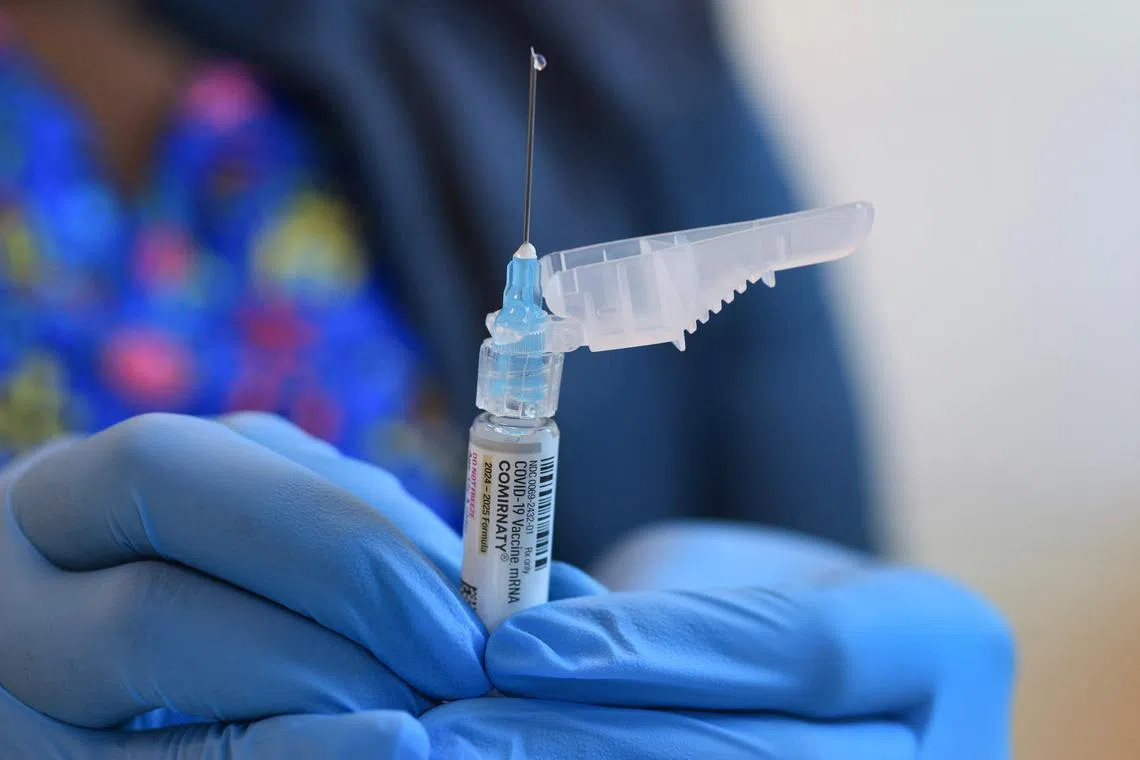Pfizer and BioNTech lose UK court appeal over Covid-19 jab
Sign up now: Get ST's newsletters delivered to your inbox

Pfizer quickly said it will appeal against the Aug 1 ruling to Britain’s Supreme Court.
PHOTO: AFP
- UK court upheld that Pfizer/BioNTech infringed one Moderna patent but another Moderna patent was invalid during their vaccine development.
- Pfizer plans to appeal to the UK Supreme Court, maintaining its stance that Moderna's patent is invalid, with no immediate impact.
- The ruling has implications for ongoing patent disputes between the companies in multiple countries concerning mRNA technology.
AI generated
LONDON - US pharmaceutical giant Pfizer and German firm BioNTech lost a court appeal on Aug 1, in the latest step of a multimillion-pound battle
The Appeals Court in London upheld an earlier British court decision in the long-running battle between the global pharma firms.
It found that one of the European patents held by Moderna was invalid, but that a second one had been broken by Pfizer and its German partner BioNTech.
“The judge made no error of law or principle” in the ruling handed down in July 2024, the Appeal Court judges wrote on Aug 1, dismissing the appeal brought by the two companies.
Pfizer quickly said it will appeal against the Aug 1 ruling to Britain’s Supreme Court.
“Today’s UK Court of Appeal’s decision does not change our unwavering stance that this patent is invalid,” Pfizer said in a statement.
“This decision has no immediate impact on Pfizer and BioNTech.”
Pfizer and BioNTech had argued that both the patents cited by Moderna were invalid, and neither had been infringed.
The Aug 1 decision could have wide implications for other cases involving the huge pharma companies in the US, Germany, Belgium, the Netherlands and Ireland.
Moderna said in a statement it was pleased with the Aug 1 ruling and would “continue to pursue and enforce its patent rights globally to protect its innovative mRNA technology”.
A British court was told in 2024 the firms had spent £19 million (S$32.5 million) fighting their legal battles.
In 2020, Pfizer and BioNTech’s vaccine became the first-ever mRNA vaccine approved for widespread use, and was swiftly deployed to combat the Covid-19 pandemic.
Scientists believe mRNA vaccines, which provoke an immune response by delivering genetic molecules containing the code for key parts of a pathogen into human cells, could be a game-changer against many diseases.
Traditional vaccines contain some form of the dead or inactivated target virus.
Since the virus need not be grown in the lab, mRNA vaccines can in theory be developed at scale more quickly than traditional vaccines.
In March, a German court in Duesseldorf also found Pfizer and BioNTech had violated a Moderna patent filed between 2010 to 2016 to make their vaccines.
The court ordered that the companies must provide estimates of how much they had profited from breaking the patent, as well as provide “appropriate compensation”. AFP


